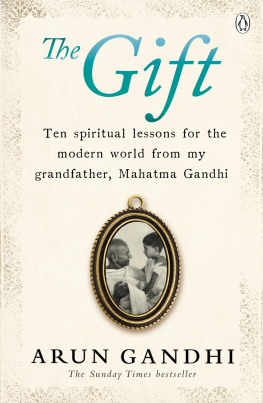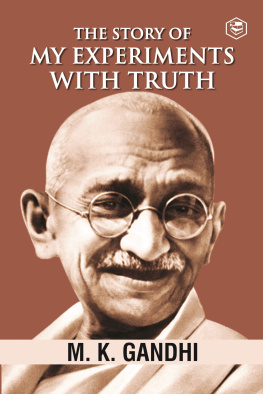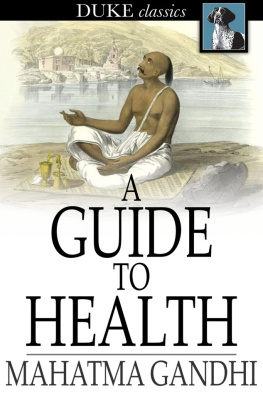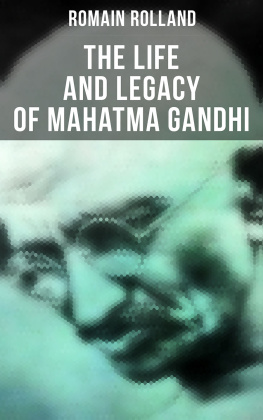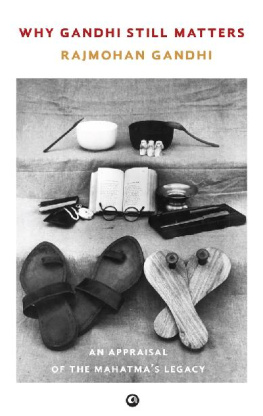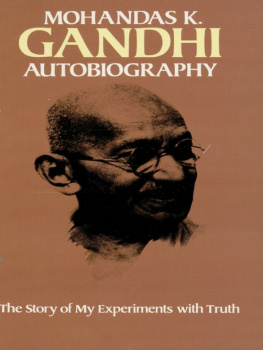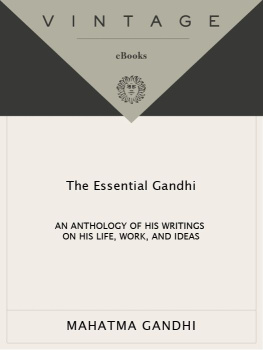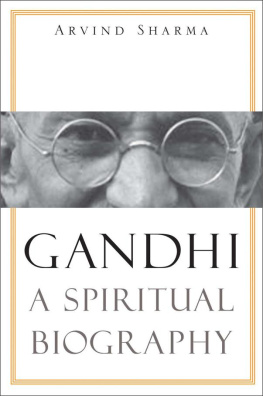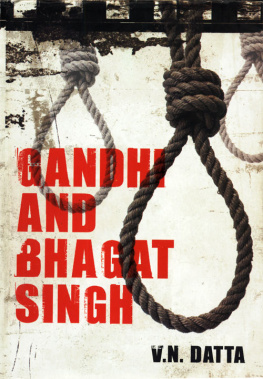Arun Gandhi - The Gift; Ten Spiritual Lessons For The Modern World By My Grandfather, Mahatma Gandhi
Here you can read online Arun Gandhi - The Gift; Ten Spiritual Lessons For The Modern World By My Grandfather, Mahatma Gandhi full text of the book (entire story) in english for free. Download pdf and epub, get meaning, cover and reviews about this ebook. year: 2018, genre: Home and family. Description of the work, (preface) as well as reviews are available. Best literature library LitArk.com created for fans of good reading and offers a wide selection of genres:
Romance novel
Science fiction
Adventure
Detective
Science
History
Home and family
Prose
Art
Politics
Computer
Non-fiction
Religion
Business
Children
Humor
Choose a favorite category and find really read worthwhile books. Enjoy immersion in the world of imagination, feel the emotions of the characters or learn something new for yourself, make an fascinating discovery.
- Book:The Gift; Ten Spiritual Lessons For The Modern World By My Grandfather, Mahatma Gandhi
- Author:
- Genre:
- Year:2018
- Rating:3 / 5
- Favourites:Add to favourites
- Your mark:
- 60
- 1
- 2
- 3
- 4
- 5
The Gift; Ten Spiritual Lessons For The Modern World By My Grandfather, Mahatma Gandhi: summary, description and annotation
We offer to read an annotation, description, summary or preface (depends on what the author of the book "The Gift; Ten Spiritual Lessons For The Modern World By My Grandfather, Mahatma Gandhi" wrote himself). If you haven't found the necessary information about the book — write in the comments, we will try to find it.
Arun Gandhi: author's other books
Who wrote The Gift; Ten Spiritual Lessons For The Modern World By My Grandfather, Mahatma Gandhi? Find out the surname, the name of the author of the book and a list of all author's works by series.
The Gift; Ten Spiritual Lessons For The Modern World By My Grandfather, Mahatma Gandhi — read online for free the complete book (whole text) full work
Below is the text of the book, divided by pages. System saving the place of the last page read, allows you to conveniently read the book "The Gift; Ten Spiritual Lessons For The Modern World By My Grandfather, Mahatma Gandhi" online for free, without having to search again every time where you left off. Put a bookmark, and you can go to the page where you finished reading at any time.
Font size:
Interval:
Bookmark:
Arun Gandhi is an internationally renowned activist and speaker, and the grandson of Mahatma Gandhi. He founded the M. K. Gandhi Institute for Non-violence in 1987 and spent thirty years as a journalist for The Times of India. Arun travels and speaks at up to sixty venues every year, from universities to the United Nations.
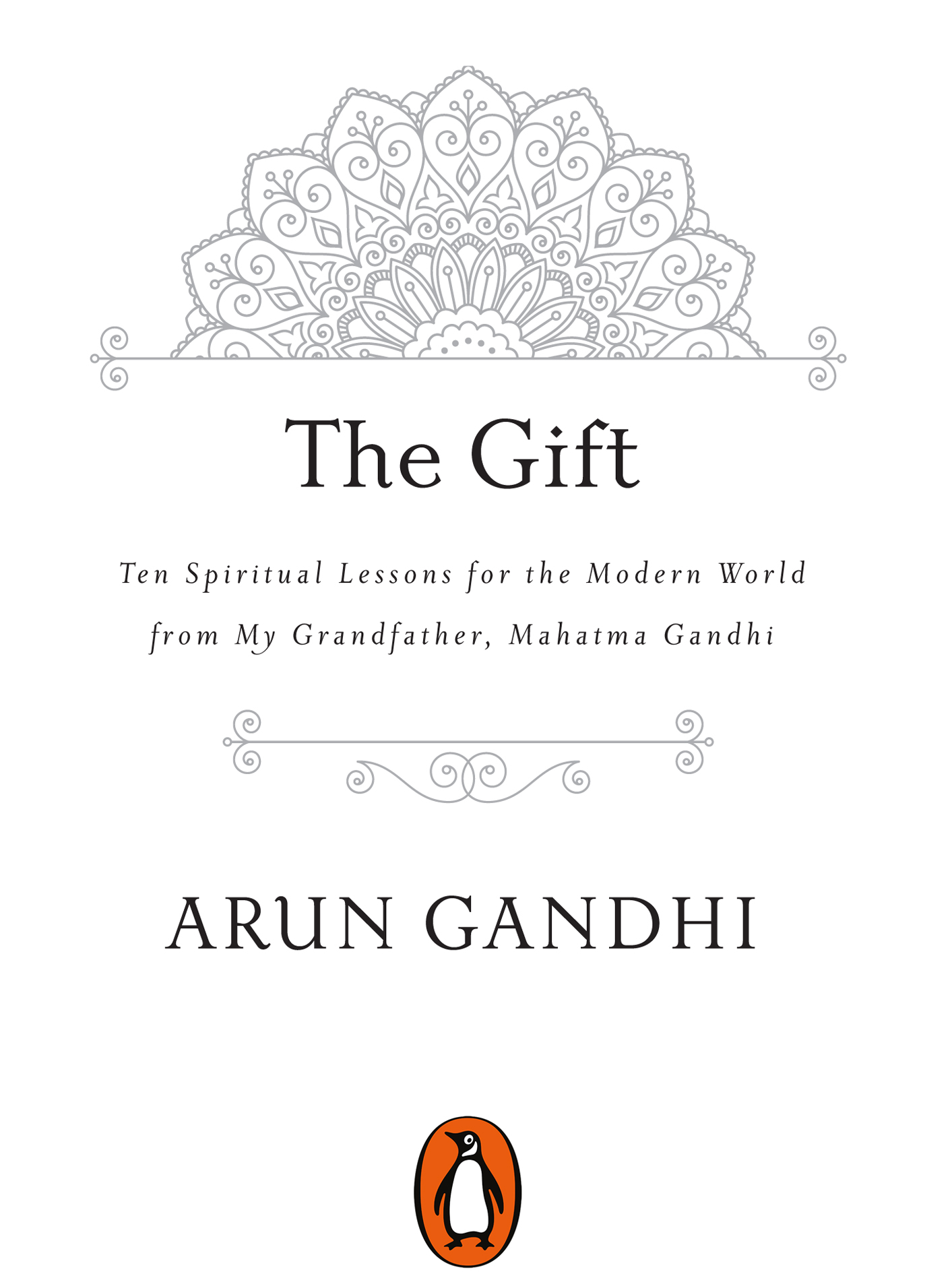
UK | USA | Canada | Ireland | Australia
India | New Zealand | South Africa
Penguin Books is part of the Penguin Random House group of companies whose addresses can be found at global.penguinrandomhouse.com

First published in the United States of America as The Gift of Anger by Gallery Books, an imprint of Simon & Schuster 2017
First published in Great Britain as The Gift of Anger by Michael Joseph 2017
Published in this retitled edition in Penguin Books 2018
Copyright Arun Gandhi, 2017
The moral right of the author has been asserted
Cover photo of Mahatma Gandhi and Arun Gandhi authors own; locket Anna Yunak / Shutterstock
ISBN: 978-1-405-93809-9
I dedicate this book to my four great grandchildren, Elizabeth (Ellie), Michael (Micah), Jonathan (Jonu), and Maya, and all the just-born and not-yet-born children of the world who must become the change if this world is to be saved from disaster.
We were going to visit Grandfather. To me, he was not the great Mahatma Gandhi whom the world revered but just Bapuji, the kindly grandfather my parents talked about often. Coming to visit him in India from our home in South Africa required a long journey. We had just endured a sixteen-hour trip on a crowded train from Mumbai, packed into a third-class compartment that reeked of cigarettes and sweat and the smoke from the steam engine. We were all tired as the train chugged into the Wardha station and it felt good to escape the coal dust and step onto the platform and gulp fresh air.
It was barely nine in the morning, but the early sun was blazing hot. The station was just a platform with a single room for the stationmaster, but my dad found a porter in a long red shirt and loincloth to help us with our bags and lead us to where the horse buggies (called tongas in India) were waiting. Dad lifted Ela, my six-year-old sister, onto the buggy and asked me to get in next to her. He and Mom would walk behind.
Then Ill walk too, I said.
Its a long distanceprobably eight miles, Dad pointed out.
That is not a problem for me, I insisted. I was twelve years old and wanted to appear tough.
It didnt take long to regret my decision. The sun kept getting hotter, and the road was paved for only about a mile from the station. Before long I was tired and sweat-soaked and covered with dust and grime, but I knew that I couldnt climb into the buggy now. At home the rule was that if you said something, you had to back it up with action. It didnt matter if my ego was stronger than my legsI had to keep going.
Finally we approached Bapujis ashram, called Sevagram. After all our travels, we had reached a remote spot, in the poorest of the poor heartland of India. I had heard so much about the beauty and love Grandfather brought to the world that I might have expected blossoming flowers and flowing waterfalls. Instead the place appeared flat, dry, dusty, and unremarkable, with some mud huts around an open common space. Had I come so far for this barren, unimpressive spot? I thought there might be at least a welcome party to greet us, but nobody seemed to pay any attention to our arrival. Where is everybody? I asked my mom.
We went to a simple hut where I took a bath and scrubbed my face. I had met Bapuji once before, when I was five years old, but I didnt remember the visit, and I was slightly nervous now for our second meeting. My parents had told us to be on good behavior when greeting Grandfather because he was an important man. Even in South Africa I heard people speaking reverentially about him, and I imagined that somewhere on the grounds of the ashram was the mansion where Bapuji lived, surrounded by a swarm of attendants.
Instead I was shocked when we walked to another simple hut and stepped across a mud-floor veranda into a room no more than ten by fourteen feet. There was Bapuji, squatting in a corner of the floor on a thin cotton mattress.
Later I would learn that visiting heads of state squatted on mats next to him to talk and consult with the great Gandhi. But now Bapuji gave us his beautiful, toothless smile and beckoned us forward.
Following our parents lead, my sister and I went to bow at his feet in traditional Indian obeisance. He would have none of that, quickly pulling us to him to give us affectionate hugs. He kissed us on both cheeks, and Ela squealed with surprise and delight.
How was your journey? Bapuji asked.
I was so overawed that I stuttered, Bapuji, I walked all the way from the station.
He laughed and I saw a twinkle in his eye. Is that so? I am so proud of you, he said, and planted more kisses on my cheeks.
I could immediately feel his unconditional love, and that to me was all the blessing I needed.
But there were many more blessings to come.
My parents and Ela stayed just a few days at the ashram before heading off to visit my mothers large family in other parts of India. But I was to live and travel with Bapuji for the next two years, as I grew from a nave child of twelve to a wiser young man of fourteen. In that time I learned from him lessons that forever changed the direction of my life.
Bapuji often had a spinning wheel at his side, and I like to think of his life as a golden thread of stories and lessons that continue to weave in and out through the generations, making a stronger fabric for all our lives. Many people now know my grandfather only from the movies, or they remember that he started the nonviolence movements that eventually came to the United States and helped bring about civil rights. But I knew him as a warm, loving grandfather who looked for the best in meand so brought it out. He inspired me and so many others to be better than we ever imagined we could be. He cared about political justice not from some grand theoretical view but because he was moved by the plight of each individual. He thought each of us deserved to live the best life we possibly could.
We all need Bapujis lessons now, more than ever. My grandfather would be sad at the depth of anger in the world today. But he would not despair.

All humanity is one family.

All humanity is one family, he told me time and again. He faced dangers and hatred in his time, but his practical philosophy of nonviolence helped liberate India and was the model for the advancement of rights around the world.
Now, again, we have to stop fighting each other to effectively address the real dangers we face. Mass shootings and lethal bombings have become part of our daily reality in America. We have seen policemen and peaceful protesters killed in cold blood. Children are murdered in schools and in our streets, and social media has become a forum for hate and prejudice. Politicians incite violence and anger rather than seek common ground.
Font size:
Interval:
Bookmark:
Similar books «The Gift; Ten Spiritual Lessons For The Modern World By My Grandfather, Mahatma Gandhi»
Look at similar books to The Gift; Ten Spiritual Lessons For The Modern World By My Grandfather, Mahatma Gandhi. We have selected literature similar in name and meaning in the hope of providing readers with more options to find new, interesting, not yet read works.
Discussion, reviews of the book The Gift; Ten Spiritual Lessons For The Modern World By My Grandfather, Mahatma Gandhi and just readers' own opinions. Leave your comments, write what you think about the work, its meaning or the main characters. Specify what exactly you liked and what you didn't like, and why you think so.

